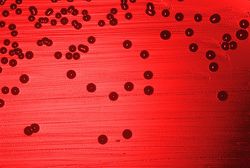Haemophilus influenzae
| This article is still under construction. |
| Also known as: | Bacillus influenzae |
Haemophilus influenzae is a species of the Haemophilus genus. There are unencapsulated and encapsulated strains. Encapsulated strains can be classified by their capsular antigens. There are six types of encapsulated Haemophilus influenzae; a, b, c, d, e, and f.
Most strains of H.influenzae are opportunistic pathogens. Haemophilus influenzae can cause; Human meningitis, septicaemia, bronchopneumonia, conjunctivitis, epiglottitis, and otitis
References
Ryan KJ; Ray CG (editors) (2004). Sherris Medical Microbiology (4th ed.). McGraw Hill.
